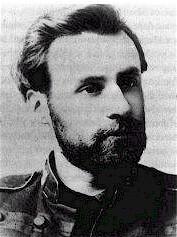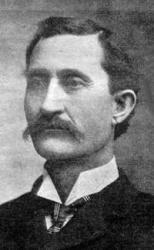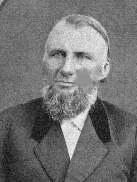Planning worship?
Check out our sister site, ZeteoSearch.org,
for 20+ additional resources related to your search.
- |
User Links
Person Results
‹ Return to hymnal







Export as CSV
Herbert H. Booth

1862 - 1926 Person Name: Booth Hymnal Number: d275 Author of "The penitent's plea" in Bells of Heaven Herbert Henry Howard Booth (26 August 1862 – 25 September 1926) was the third son of William and Catherine Booth. He oversaw the Limelight Department's development and he was the writer and director for Soldiers of the Cross.
See also in:
Wikipedia
Herbert H. Booth
M. M. Wells
1815 - 1895 Person Name: Marcus M. Wells Hymnal Number: d115 Author of "Holy Spirit, faithful Guide" in Bells of Heaven Converted to Christianity as a youth at a mission in Buffalo, New York, Marcus Morris Wells (b. Cooperstown, NY, 1815; d. Hartwick, NY, 1895) spent most of his life near Hartwick as a farmer and maker of farm implements. He is remembered in hymnody for writing both the text and tune of "Holy Spirit, Faithful Guide." "On a Saturday afternoon, October 1858, while at work in my cornfield, the sentiment of the hymn came to me," writes Wells. "The next day, Sunday, being a very stormy day, I finished the hymn and wrote the tune for it and sent it to Prof. I. B. Woodbury." Isaac Woodbury was the editor of the New York Musical Pioneer, and the original text and tune were first published in that periodical's November 1858 issue.
Bert Polman
=================
Wells, Marcus M. Concerning this author and his hymn we have no information beyond the following facts:—
Holy Spirit, faithful Guide. [Whitsuntide.] Appeared in The Sacred Lute, by T. E. Perkins, N.Y., undated [1864], p. 373, with music. Both words and music are attributed therein to M. M. Wells. The hymn has since been repeated in several English and American collections, including I. D. Sankey's Sacred Songs and Solos, 1878. It is dated 1858.
--John Julian, Dictionary of Hymnology, New Supplement (1907)
M. M. Wells
Eben E. Rexford

1848 - 1916 Hymnal Number: d333 Author of "On the hills beyond the river" in Bells of Heaven Rexford, Eben Eugene.M (Johnsburg, New York, July 16, 1848--October 16, 1916, Shiocton, Wisconsin). Horticulturalist and editor of a Wisconsin farm journal. Many of his verses were used to fill empty corners of the journal. He also wrote many books on gardening. Lawrence University (Appleton, Wisc.), Litt.D. Twenty-five years, organist at First Congregational Church, Shiocton.
See: Smith, Mary L.P. (1930). Eben E. Rexford; a biographical sketch. Menasha, Wis., George Banta Pub. Co.
--Leonard Ellinwood, DNAH Archives and Gabriel, Charles H. (1916). Singers and Their Songs. Chicago: The Rodeheaver Company.
===============
Rexford, Eben Eugene , an American writer, born July 16, 1848, is the author of Nos. 199, 246, 263, 353, in I. D. Sankey's Sacred Songs and Solos), 1878, No. 5, and 456 in the Methodist Sunday School Hymnbook, 1879.
--John Julian, Dictionary of Hymnology, Appendix, Part II (1907)
================
Rexford, E. E. , p. 1587, ii. Additional hymns by this author in common use include:—
1. He saw the wheat fields waiting. Harvest of the World.
2. O where are the reapers. Missions.
3. Rouse up to work that waits for us. Duty.
4. We are sailing o'er an ocean. Life's Vicissitudes.
--John Julian, Dictionary of Hymnology, New Supplement (1907)
================
Eben E. Rexford
Charlie D. Tillman

1861 - 1943 Hymnal Number: d40 Author of "Brother hear the invitation, Jesus will save" in Bells of Heaven Tillman, Charles "Charlie" Davis. (Tallahassee, Talapoosa County, Alabama, March 20, 1861--1943). Married Anna Killingsworth (Dec. 24, 1889); four daughters, one son (d.1910).
--Keith C. Clark, DNAH Archives
Charlie D. Tillman
Aaron R. Wolfe

1821 - 1902 Hymnal Number: d3 Author of "A parting hymn we sing Around Thy table, Lord" in Bells of Heaven Wolfe, Aaron Robarts, was born at Mendham, New Jersey, Sep. 6, 1821, and educated at Williams College, 1844; and the Union Theological Seminary, New York, 1851. On April 9, 1851, he was licensed by the Third Presbytery of New York. For some lime he had charge of a school for young ladies at Tallahassee, Florida; and in 1859 he established "The Hillside Seminary for Young Ladies" at Montclair, New Jersey. In 1858 he contributed 7 hymns under the signature "A. R. W." to Hastings's Church Melodies. These are:—
1. A Parting hymn we sing. Close of Holy Communion.
2. Complete in Thee, no work of mine. Complete in Christ. Published in the N. Y. Evangelist, 1850 or 51.
3. Draw near, O Holy Dove, draw near. Holy Communion.
4. How blest indeed are they. In the Likeness of Christ.
5. My God, I thank Thee for the guide. Conscience.
6. Mysterious influence divine. The Cross of Christ.
7. Thou Maker of our mortal frame. Chief end of Man.
The most popular of these hymns are Nos. 1, 2, and 3. [Rev. F. M. Bird, M.A.]
-- John Julian, Dictionary of Hymnology (1907)
Aaron R. Wolfe
William Hiley Bathurst

1796 - 1877 Person Name: William H. Bathurst Hymnal Number: d224 Author of "O, for a faith that will not shrink" in Bells of Heaven Bathurst, William Hiley , M.A., son of the Rt. Hon. Charles Bragge (afterwards Bathurst) some time M.P. for Bristol, born at Clevedale, near Bristol, Aug. 28, 1796, and educated at Winchester, and Christ Church, Oxford, graduating B.A. in 1818. From 1820 to 1852 he held the Rectory of Barwick-in-Elmet, near Leeds. Resigning the Rectory in the latter year, through his inability to reconcile his doctrinal views with the Book of Common Prayer, he retired into private life, and died at Lydney Park, Gloucestershire, Nov. 25, 1877. His works include, The Georgics of Virgil: Translated by W. H. B., 1849; Metrical Musings; or, Thoughts on Sacred Subjects in Verse, 1849; and Psalms and Hymns for Public and Private Use, 1831 (2nd ed. 1842). This last contains 141 versions of Psalms, and 206 hymns. All the latter, and many of the former are original. Of his hymns, those in most extensive use are, "Hark! the distant isles proclaim," "Holy Spirit from on high,” "Jesus, Thy Church with longing eyes,” "Eternal Spirit, by whose power," "O for a faith that will not shrink” and “O Saviour, may we never rest." In addition to these and a few others (all of which are annotated under their first lines), the following are in common use, but mainly in America:—
1. Before Thy cross, my dying Lord. Faith.
2. Before Thy mercy-seat, O Lord. Holy Scriptures.
3. Behold what unspeakable love. Heaven.
4. Does the Lord of Glory speak? Holy Scripture.
5. Ere the world with light invested. Holy Spirit.
6. Except the Lord our labours bless. Ps. cxxvii.
1. Full of weakness and of sin. The Creator Spirit desired.
8. Glory to the Almighty Father. Praise.
9. Holy Lord, our hearts prepare. Preparation for Prayer.
10. Holy Spirit from on high. Holy Spirit's direction implored.
11. How blest are they who feel the weight. Repentance.
12. How strange that souls whom Jesus feeds. Conflict.
13. How sweet it is in early youth. Youthful Piety.
14. How sweet the hour of closing day. Death.
15. Led by a Father's gentle hand. Communion of Saints
16. Lord, a better heart bestow. Lent.
17. Lord, bid the light arise. To the Holy Spirit.
18. Lord, shed Thy glory as of old. Whitsuntide.
19. Lord, what blessed consolation. Safety of the Church.
20. Lord, when our offerings we present. Offertory.
21. 0 for a beam of heavenly light. Lent.
22. 0 for that flame of living tire. Holy Spirit.
23. 0 give thanks unto the Lord. Ps. cv.
24. Shepherd of Israel, from above. On behalf of Children.
25. This day the Lord hath called His own. Sunday.
26. When the world my heart is rending. Heaven.
27. Why search ye in the narrow tomb? Ascension.
28. Ye servants of the living God. Praise.
All these hymns were given in his Psalms & Hymns , &c, 1831 (Preface dated November 15th, 1830), and repeated, without alteration, in the 2nd ed., 1842. They are characterized by simplicity of language, and directness of aim; but do not in any instance rise above the ordinary level of passable hymn-writing. In some American collections Bathurst's name is contracted to "Bath," and this is regarded either as a complete surname or as a Bath Collection. The contraction was given by Bickersteth in his Christian Psalmody, 1833.
--John Julian, Dictionary of Hymnology (1907)
===================
Bathurst, William H., p. 117, ii. Additional hymns from his Psalms & Hymns, 1831, are in common use as follows:—
1. Great God, when I approach Thy throne. Redemption.
2. How bright a day was that which saw. The First Sabbath.
3. How frail and fallible I am. Jesus Unchangeable.
4. In Jesus' name with one accord. Divine Worship.
5. Lord, I claim Thee for my own. Ps. lxiii.
6. Lord shew Thy glory as of old. This is not "Lord shed Thy glory, &c," as stated at p. 118, i., 18.
7. Lord, when I lift my voice to Thee. Ps. ci.
8. O Lord, defend us as of old. Ps. lxxiv.
9. O Lord, how long shall heathens hold. Ps. lxxix.
10. 0 Lord, look down with pitying eye. Intercession for the Jews. Begins with st. iv. of “0 how is Zion's glory gone."
11. Praise God, O my soul. Ps. cxlvi.
12. Saviour, at Thy feet we bow. United Prayer.
13. 'Tis past, that agonizing hour. Ascension.
14. The Lord look'd all around. Universal Corruption.
15. To the Source of every blessing. Praise to the Father.
16. What can relieve the troubled soul? Christ the Comforter.
--John Julian, Dictionary of Hymnology, Appendix, Part II (1907)
William Hiley Bathurst
M. P. Ferguson
1850 - 1932 Person Name: Mamie P. Ferguson Hymnal Number: d180 Author of "Sweetly resting" in Bells of Heaven Manie Payne Ferguson United Kingdom 1850-1932. Born in Carlow, Ireland, in 1883 she married Theodore Pollock Ferguson, a past Presbyterian minister from Ohio, who had become an itinerant evangelical preacher. They moved to Los Angeles, CA, in 1885. He became a pioneer leader in the American Holiness Movement, a Christian evangelist, and social worker, founding, along with her husband, the non-denominational Peniel Mission in 1886. In 1894 they received a significant financial donation from George Studd allowing them to expand the mission. They constructed a 900-seat auditorium and ministry centre there in Los Angeles. They partnered with Studd and Phineas Bresee, each acting as a superintendent of the mission organization. In 1894 Dr. Joseph Widney, President of USC, led the dedication Praise service, and Bresee preached the later service. Widney and Bresee separated from the mission in 1895 to form the Church of the Nazarene, and Manie Fergusion provided primary leadership of the Peniel Mission. The mission provided ministry especially for single women, who lived in rented rooms near the auditorium, where evangelical services were held. The Fergusions managed to live on income from three small houses they owned, and mission rents and donations covered mission expenses. Street-corner meetings were held in the afternoon, evangelical services at night, and a meal was served afterward. Converts were asked to join a local church of their choice. Manie continued the mission work after her husband's death until her own death. In 1947 the mission became part of the World Gospel Mission enterprise. Manie wrote many poems and also authored hymn lyrics. She died in Los Angeles.
John Perry
M. P. Ferguson
F. L. Eiland

1860 - 1909 Person Name: Franklin L. Eiland Hymnal Number: d19 Author of "The glorious gospel train" in Bells of Heaven Franklin L. Eiland was born in Noxubee county, Miss., March 25, 1860. He was reared on the farm and attended the old field school. The
school house on the hill and the old Oaken Bucket, etc., etc., were objects of interest in his curriculum. He had traveled some before finally leaving home including a trip to Tx, but in 1882 he came to Tx to remain. November 13, 1884 he married Miss Mary E. Nisbett of Robertson county. She lived nine years. In 1894 he married Miss Ella May Kennedy of Van Zandt county. She lived only 10 days. October 21, 1896 he married Miss Minnie Jarushia Valentine of McLennan county. She still survives. They have one sweet little daughter, Mary Ella Oree. She is quite bright and is already starting music at the age of three. Little Elva Lynn came Sept. 16, 1901 and God took her
Aug. 9, 1902. The Eilands have been farmers and professional men along many lines, but Prof. Eiland was the only one that ever embarked in the music business. He was inclined to music from a child and appropriated all the advantages in this line that came his way. Many things of minor importance happened along his life but in 1884 he fell into a meeting conducted by Maj. W. E. Penn, and the superior music rendered there awaked all his latent talent and set him on fire with a desire to make a musician. He at once began a musical career that has attained an abundant success. He soon began teaching and continuing to study to became a composer. He sought the association of those who could teach him and in this and other ways has enjoyed advantages of the best talent to be found. In 1893 he began publishing. From this, came in due time The Trio Music Co. now operated in Waco. Prof. E. is president of the company and editor in chief of the journal. He moved later to Myrtle Springs to secure the benefit of the wonderful waters of those springs. He is given great credit for good influence wielded for his church and community.
From "The Southland", Vol. XII. No. 1, Waco Tx
F. L. Eiland
J. K. Alwood

1828 - 1909 Person Name: Josiah K. Alwood Hymnal Number: d236 Author of "The unclouded day" in Bells of Heaven Alwood, Josiah Kelley. (Harrison County, Ohio, July 15, 1828--January 13, 1909, Morenci, Michigan). Ordained by the United Brethren in Christ, he spent many years as a circuit rider, traveling on horseback to his many appointments. He would be gone from his family for weeks at a time while he held revival meetings and lectured on Christian doctrine. Later, he became a presiding elder in the North Ohio Conference and was a delegate to several general conferences of his church. Always a staunch supporter of the original constitution of his denomination, he was a delegate to the general conference at the time of the separation of the church into two groups at York, Pennsylvania, in 1889.
--William J. Reynolds, DNAH Archives
J. K. Alwood
Thomas Shepherd
1665 - 1739 Hymnal Number: d207 Author of "Must Jesus bear the [his] cross alone" in Bells of Heaven Shepherd, Thomas, son of William Shepherd, sometime Vicar of Tilbrook, Bedfordshire, and subsequently a Nonconformist Minister at Oundle, and at Kettering, was born in 1665. Taking Holy Orders he held for some time preferment in Huntingdonshire, and in Buckinghamshire. Seceding from the Church of England, he became, in 1694, pastor of the Castle Hill Meeting House (Independent), Nottingham, of which Dr. Doddridge was subsequently pastor. In 1700 he removed to Bocking, near Braintree, Essex, where he began his work in a barn. A chapel was erected for his congregation in 1707. He died Jan. 29, 1739. His publications consisted chiefly of Sermons, His Penitential Cries were a continuance of those by John Mason, who wrote the first six and the version of Ps. 86, and were published with Mason's Songs of Praise in 1693. It must be noted that in D. Sedgwick's reprint of the Songs, and the Penitential Cries, in 1859, Mason's Cries are under the head of Songs, &c, pp. 49-61, and those under Penitential Cries, are all by Shepherd. Some of these Cries are still in common use including, "My God, my God, my Light, my Love " (Longing for God) ; and "When wilt Thou come unto me, Lord" (Communion with God desired).
-- John Julian, Dictionary of Hymnology (1907)
Thomas Shepherd


 My Starred Hymns
My Starred Hymns


